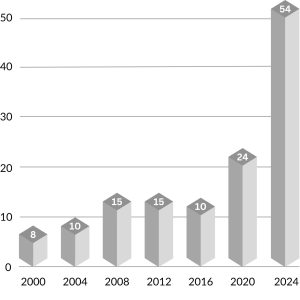
Source: Ibid Yearbook archives (Orion Kim)
Earlier this year, white stickers reading “Math Team > Student Math Club” were stuck to walls, laptops, and even foreheads around campus. The Math Team printed these stickers in the design lab, hoping to bruise their rival club’s reputation. While the club leaders were friends poking fun at each other, this math vs. math example illustrates a larger problem with the club structure overall.
On the surface, a large number of clubs might appear impressive, but it’s not. Currently, there are 54 clubs, affinity, and special interest groups listed in the Student Hub: around one X-Period offering for every seven students. Consider leadership positions, and the numbers get worse. Students who hold leader or co-leader status adds up to a staggering 106: totaling more “leaders” than the entire population of the senior class.
While the creation of new affinity groups based on identities in the school should continue as is, it’s past time to revamp what makes a club a club.
It needs to start with a better proposal process.
Currently the administration only requests a form with 10 signatures, a supervisor, and a meeting space.
If club founder hopefuls had to demonstrate how their group was bringing something that doesn’t currently exist to the offerings, find a faculty advisor who was not already advising a club, recruit a minimum of five committed members to attend every week, and propose a plan for at least one annual community event, (fewer) clubs would be approved with more vision and purpose.
It continues with leadership.
The current model devalues leadership; oversaturating the club leader role discourages competition and proactivity. It also undermines the value of contributing to a collective interest without a title.
Club leadership should be limited to one president. If the group is large or active, consider a president-elect position a 9-11 grader would hold, offering presidents an opportunity to mentor.
It extends to membership.
Clubs require time and effort, but with the current system, it’s easier to participate passively in multiple clubs than to make a real difference in one. If a student feels pressure to join multiple groups, they’ll do them all at a shallow level. The current system also makes it easy for people to segregate, avoiding not just awkward social interactions, but robbing students of the chance to make new connections across grade levels and difference.
The first month of school could include weekly meetings that encourage visiting a number of clubs at the start of the year, but then students should regularly attend one.
The division of math team and math clubs does not stand alone.
A large number of groups at school have been founded even though there were already similar pre-existing clubs. We used to just have PLAY: why couldn’t pickleball, football, spikeball, and ping-pong (to name a few) integrate into that group?
Combining clubs would help enhance the value of leadership and participation.
What does leadership mean if everyone leads a club? how engaged can clubs be if there aren’t many members?
The clubs system doesn’t translate to success.
Oversaturation of clubs (and leaders) doesn’t give students the resume boost they think it does. According to the Princeton Review, racking up leadership roles and compiling a participation laundry list holds less value than pursuing a passion, regardless of a student’s title in those groups. The lesson? In-school extracurriculars are an opportunity to expand on an interest rather than add a superficial line on an application. Colleges want to see that a student intends to make an impact on a community inside or outside of school.
Invest the time.
Under the current X-Period schedule, it can be hard for clubs to accomplish anything. Student-led clubs gathered only four times during fall semester, when in previous years they met weekly. As a result, clubs need to be strategic and prioritize making a difference, which can only be possible with a collective of dedicated students.
This semester, use clubs as an avenue to unite interests, not compete with people who share similar passions. Prioritize outreach, commitment, and making an impact.
Looking to next year, reenvision clubs. Create a competitive process. Add back meeting time. Require engagement. Then clubs will be, in reality, the rich offering they appear to be.